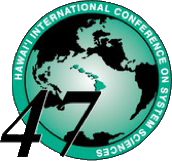Open Data and Cloud Services Minitrack

Co-chairs
Marijn Janssen (Primary Contact)
Faculty of Technology, Policy and Management
Delft University of Technology
Jaffalaan 5
NL-2600 GA Delft, The Netherlands
Phone: +31-15-278-1140
Email: m.f.w.h.a.janssen@tudelft.nl
Yannis Charalabidis Information Systems Laboratory
Department of Information and Communication Systems Engineering
University of the Aegean
83200 Samos, Greece
Phone: +30-22-730-82221
Email: yannisx@aegean.gr
Helmut Krcmar
Technische Universität München
Chair for Information Systems
Boltzmannstr. 3
D-85748 Garching bei München, Germany
Phone: +49-89-289-19530
Fax +49-89-289-19533
Email: krcmar@in.tum.de

Public organizations are releasing their data to the public, developing, sharing and sourcing their services and taking advantage of the cloud. Public systems are more and more connected with each other and with systems of others resulting in a spaghetti of interconnected systems. All these efforts require information sharing and interoperability to ensure that systems work in concert. Moreover decisions concerning the development, operation and maintenance of services and hosting of the services in the cloud should be made. All these developments impacts the technical, organizational, managerial and strategic level. Yet it is unclear what should be done and what the impact is.
Open data is recent phenomenon in which data is made available and can be used by everybody for what it seems an unlimited amount of purposes. Infrastructures are generic facilities facilitating organizational collaborating, service provisioning and business processes. Nowadays apps and generic platforms are developed to enable interoperability on top of which others can develop comprehensive services. Interoperability is the ability of diverse systems and organizations to work together. Cloud services are a new way of providing and using ICT based on virtualized resources meeting security, privacy and scalability requirements. Clouds provide the opportunity to share resources and provide shared services over the Internet, so that administrations, enterprises and citizens can benefit from open data and shared services. All these developments are changing the government.
This minitrack is aimed at discussing theories, methodologies, experience reports, literature and case studies in the field of open data, interoperability and cloud services. We solicit for papers covering both technical and organizational aspects and combining theory and practice. Papers covering the topics below are strongly encouraged. We promote a diversity of research methods to study the challenges of this multifaceted discipline focusing on various aspects of interoperability and also theoretical papers and papers from developing countries.
Topics and research areas include, but are not limited to:
-
-System development, implementation and agility for digital public services
-
-System, user data- and process-based integration
-
-Information infrastructures, cloud infrastructures, reuse and quality in digital public services
-
-Semantic ontologies, web services and modeling for governmental infrastructures
-
-Cloud computing, ICT-services, scalability, reliability, flexibility
-
-Multi-sided platforms, interoperability, information sharing
-
-Software as service (SaaS), utility computing, shared services, cloud providers
-
-Cross-organizational modeling and visualization ranging from the organizational to technical level
-
-Infrastructure and enterprise architecture planning, alignment, strategies and governance
-
-Interoperability and architecture standards, principles and frameworks
-
-Technical, semantic, organizational, managerial and legal/policy aspects of interoperability
-
-Organizational and/or policy perspectives on the dynamics of the infrastructure and interoperability process and barriers to interoperability
-
-Service-oriented architectures, web services, semantic web services, orchestration and composition
-
-Open data, Linked data, meta-data and semantic technologies leading to enhanced digital public services
-
-Best practices and case studies and longitudinal studies
-
-Theoretical contributions and contributions from developing countries
More co-chair information
Marijn Janssen, PhD, is Professor in ICT and Governance, and Director of the interdisciplinary Systems Engineering, Policy Analyses and Management Master programme of the Technology, Policy and Management Faculty of Delft University of Technology. He manages the Toptech executive programme “IT and Business Architectures” andconducted and managed a large number of research projects and published over 220 refereed publications and serves on several editorial boards and conferences in the area of e-government. For more information, visit www.tbm.tudelft.nl/marijnj.
Yannis Charalabidis, PhD, is an assistant professor in the University of Aegean, in the area of eGovernment Information Systems, while also heading eGovernment & eBusiness Research in the Decision Support Systems Laboratory of National Technical University of Athens (NTUA), coordinating policy making, research and pilot application projects for governments and enterprises worldwide. A computer engineer with a PhD in complex information systems, he has been employed for 8 years as an executive director in Singular IT Group, leading software development and company expansion in Eastern Europe. He writes and teaches on eGovernment Information Systems, Interoperability and Standardization, eParticipation and Government Transformation in NTUA and the University of Aegean. He has published more the 100 papers in international journal and conferences. He is the Best Paper Award winner of the EGOV 2008 Conference, Best e-government Paper Nominee in the 42nd HICSS Conference and 1st Prize Nominee in the 2009 European eGovernment Awards.
Helmut Krcmar, PhD, olds the Chair for Information Systems, Faculty of Informatics, Technische Universität München (TUM), Germany and serves as Dean of the Faculty of Informatics. He is also a member of the faculty of the TUM Business School. He received a Ph.D. in business administration (University of Saarbrücken) and has worked as Post Doctoral Fellow at the IBM Los Angeles Scientific Center and as Assistant Professor of Information Systems (Leonard Stern Graduate School of Business, New York University and Baruch College, City University of New York). 1987 to 2002 he held the Chair for Information Systems, Hohenheim University, Stuttgart, Germany, where he served as Dean of the Faculty of Business, Economics and Social Sciences from 2000 to 2002. His research interests include Information and Knowledge Management, IT-enabled Value webs, Service Management, Computer Supported Cooperative Work and Information Systems in Health Care and eGovernment.

“Open Data and Cloud Services are Major Elements in Building 21st Century Government”









